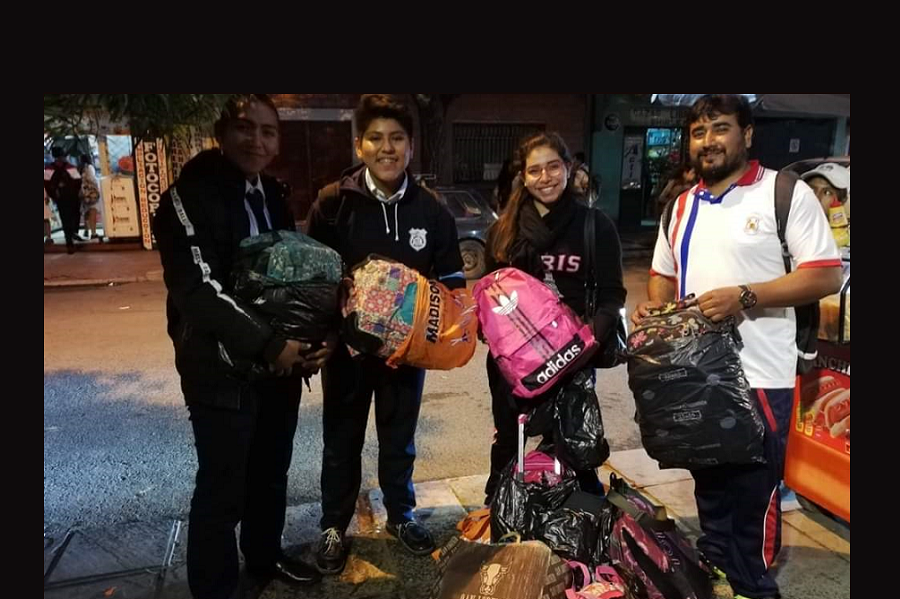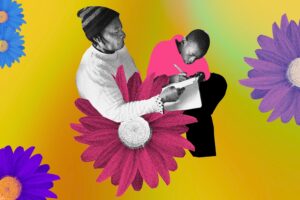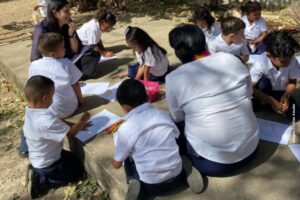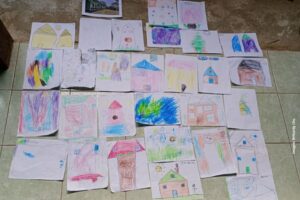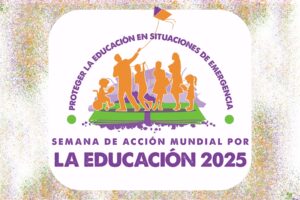“The campaign #TheEducationWeNeed had the positive change of encouraging us students to insist in being heard all the time, and even more when it is much more strongly needed and much more important, because education is power”, affirmed Gabriel Villarpando, a final year Law student and a member of the Bolivian Campaign for the Right to Education (CBDE), at the region of Tarija, Bolivia.

24-year-old Gabriel Villarpando was one out of more than 50 young people and adolescents that took part in
#TheEducationWeNeed for the world we want initiative, carried out between Oct. 2019-Apr. 2020, with the purpose of encouraging adolescents and youths from Latin America and the Caribbean to share their expectations and opinions on the right to education.
After experiencing #TheEducationWeNeed, Gabriel started the #Mochila2.0 [#Backpack2.0] campaign, aimed at fostering conversations on the right to education and, in turn, collecting backpacks that stopped being used and distributing them to students who need them.
The collected backpacks will be distributed next week to rural communities and [people] in situation of vulnerability in the region of Tarija and then the students receiving these donations will be interviewed and filmed, expressing their opinions and suggestions on the right to education.
“The education we need is emacipatory, equitative and inclusive education. An education that can have an effect, that is accessible, that is, that education exists everywhere”, affirmed Villarpando.
In the conversation below, Gabriel explains the #Mochila2.0 campaign and comments on his experience of joining #TheEducationWeNeed initiative and on the importance of emancipatory education for adolescents and youths.
¿What is #Mochila2.0 iniciative?
Gabriel Villarpando – This initiative consists in the possibility of collecting backpacks no longer used, to be recycled so other people going to school can use them.
The idea is to encourage students and parents to donate backpacks that are being put aside. Initially, we collected them and soon we will be donating them to encourage indigenous land workers who are out of the city, who live in rural areas [to go to school]. For them it is much more difficult to get new school materials every year, such as, in this specific case, backpacks. We want to bring this campaign to encourage students from indigenous peoples in the fields, starting with the students from the people Weenhayek.

How is it evolving?
Gabriel Villarpando – We shared a call through the education centers that joined the campaign or that are working with us as a team and also through the secondary students’ federation. Besides, we have a group working as the initiative’s coordination team, named Unidos en Acción [Acting Together].
This campaign was officially launched in February 8, with [the participation of] education centers.
Where does such an idea come from?
Gabriel Villarpando – This idea comes from thinking how useful such a school material, the backpack, can be for our students, because we need to carry our notebooks, pencils and other school materials everyday to our education centers. The backpack helps us to transport all our materials much more easily.
Everything really came from this thoughs, because for indigenous peoples it’s very difficult to be have the conditions to afford or renew their school material every year, in this case the backpack, since they live in rural areas and there is not much commerce there. They also have to go to the city and many of these families are really humble, and if they manage to get to the city —what doesn’t happen so frequently—, it is for buying essential goods, such as food and other groceries.
Many students from indigenous peoples don’t even have a backpack, many carry their notebooks and pencils in their hands. We saw a problem and a necessity is this regard, and we wanted to create the campaign #Mochila2.0 to encourage these students [to go to school].
In what moment was it connected to #TheEducationWeNeed for the world we need for the world we want campaign?
Gabriel Villarpando – Well, the campaign is actually connected to the concept of promoting the full exercise of the right to education as a human right and to officialize and promote public policies which can cooperate to the generation of a change towards the education we need, opening the way to having a better world as a result.
This is why we encourage the donation of the backpacks put aside, being used again these goods can generate a change so students can keep going to their school centers, alleviating the difficulties in their school life, especially considering they live far away or in the rural area. In that sense, our campaign wanted to remind the 30th anniversary of the UN Convention on the Rights of the Child [celebrated on November 20, 2019].
For you, what is the #EducationWeNeed for the world we want?
Gabriel Villarpando – The education we need is emacipatory, equitative and inclusive education. An education that can have an effect, that is accessible, that is, that education exists everywhere, giving priority to schools in rural areas, because many students walk for hours to attend their education centers. So this is why it has to be inclusive, accessible and this is the education we need.
Do you consider to develop other activities in regards to the same subject or initiative?
Gabriel Villarpando – Of course we do, because the most important is that this campaign setting will result in the possibility of articulating and advocating to our authorities, people, decision-makers to generate public policies in benefit of the defense of the right to education.
Could you identify any positive change after having taking part in the campaign #TheEducationWeNeed?
Gabriel Villarpando – Of course I can. It was very important to get to listen to the voices of the [education] leading actors, such as the students, and the empathy they generated in the process of sharing their experiences, their livingness, to demand or socialize the education we need for the world we want.
“The campaign #TheEducationWeNeed had the positive change of encouraging us students to insist in being heard all the time, and even more when it is much more strongly needed and much more important, because education is power”
The role it plays to generate public policies or to demand that this right is NOT vulnerated is really important. It even encourages us students to get involved in this advocacy plan to be developed, with all our demands and needs in regards to the field of education
Especially, in this stage of transition or political crisis Bolivia is going through, around the new elections for our country’s president.
What we see is the #TheEducationWeNeedcampaign had the positive change of encouraging us students to insist in being heard all the time, and even more when it is much more strongly needed and much more important, because education is power”
Would you like to add anything else?
Gabriel Villarpando – This campaign was officially launched on February 8, with [the participation of] education centers. Nevertheless, I hope you can join this campaign, disseminating it and sharing it with your student friends or colleagues at all levels, so we can reach more people and also encourage other civil society organizations, coalitions or platforms in defense of education to join and replicate this kind of initiative.

